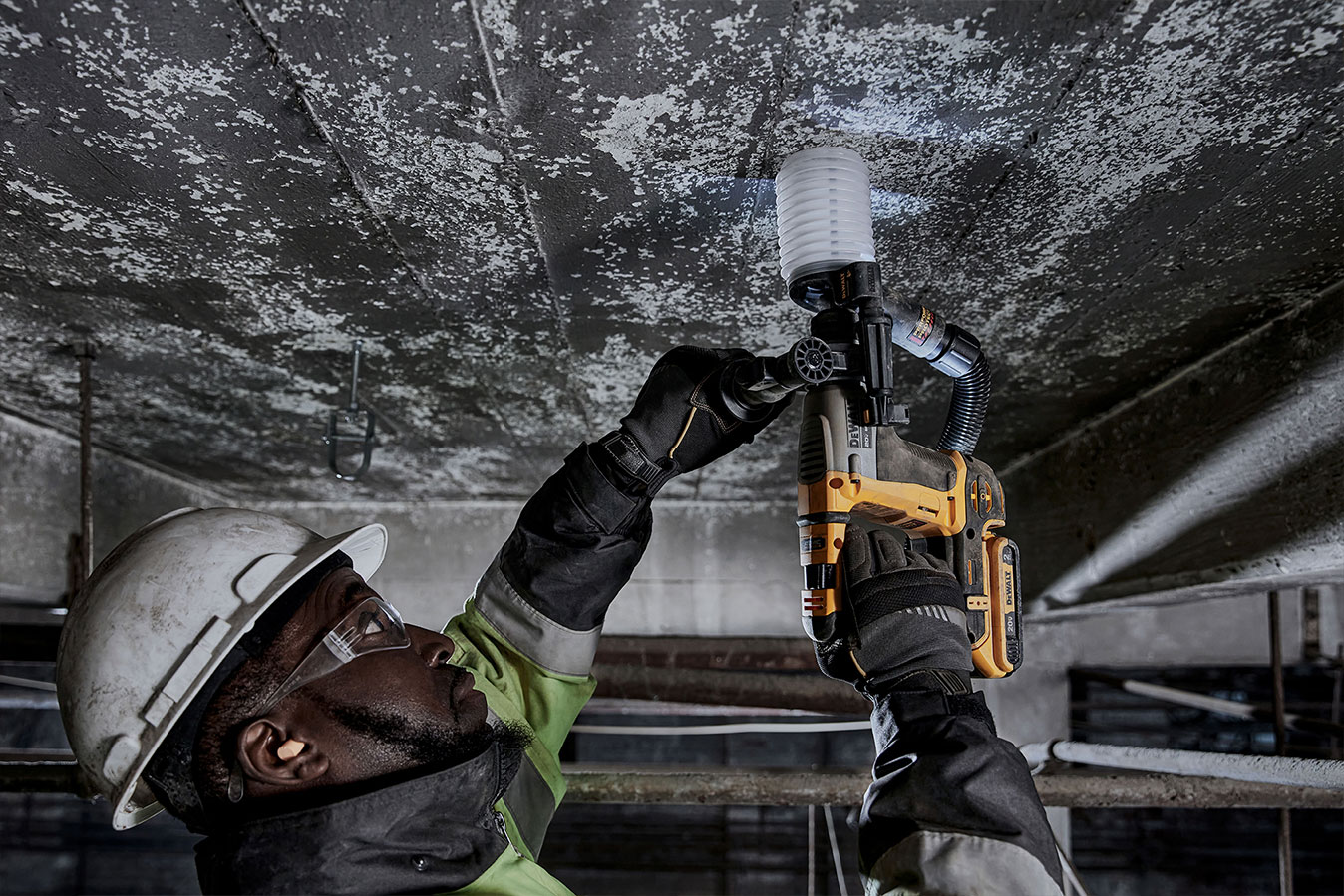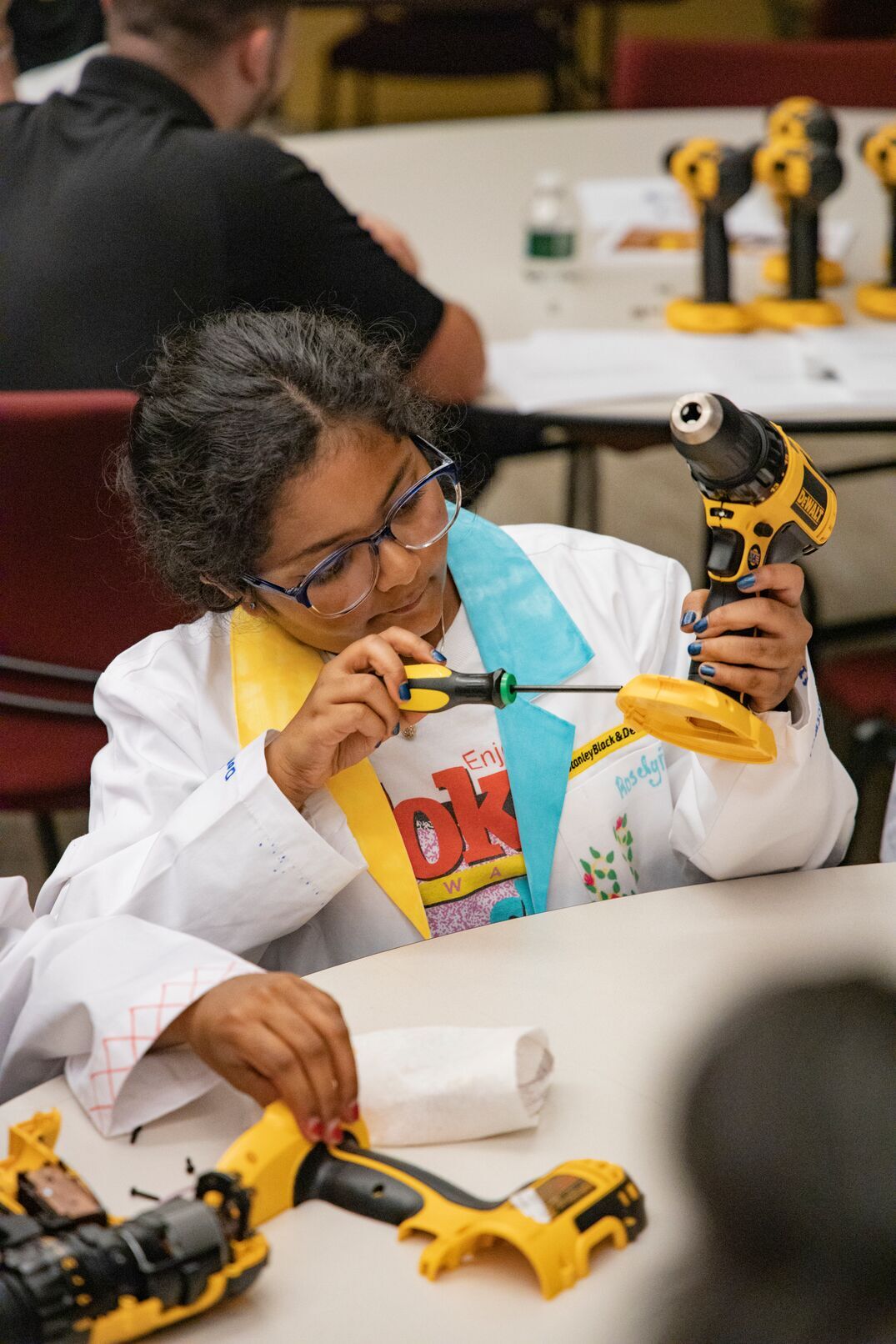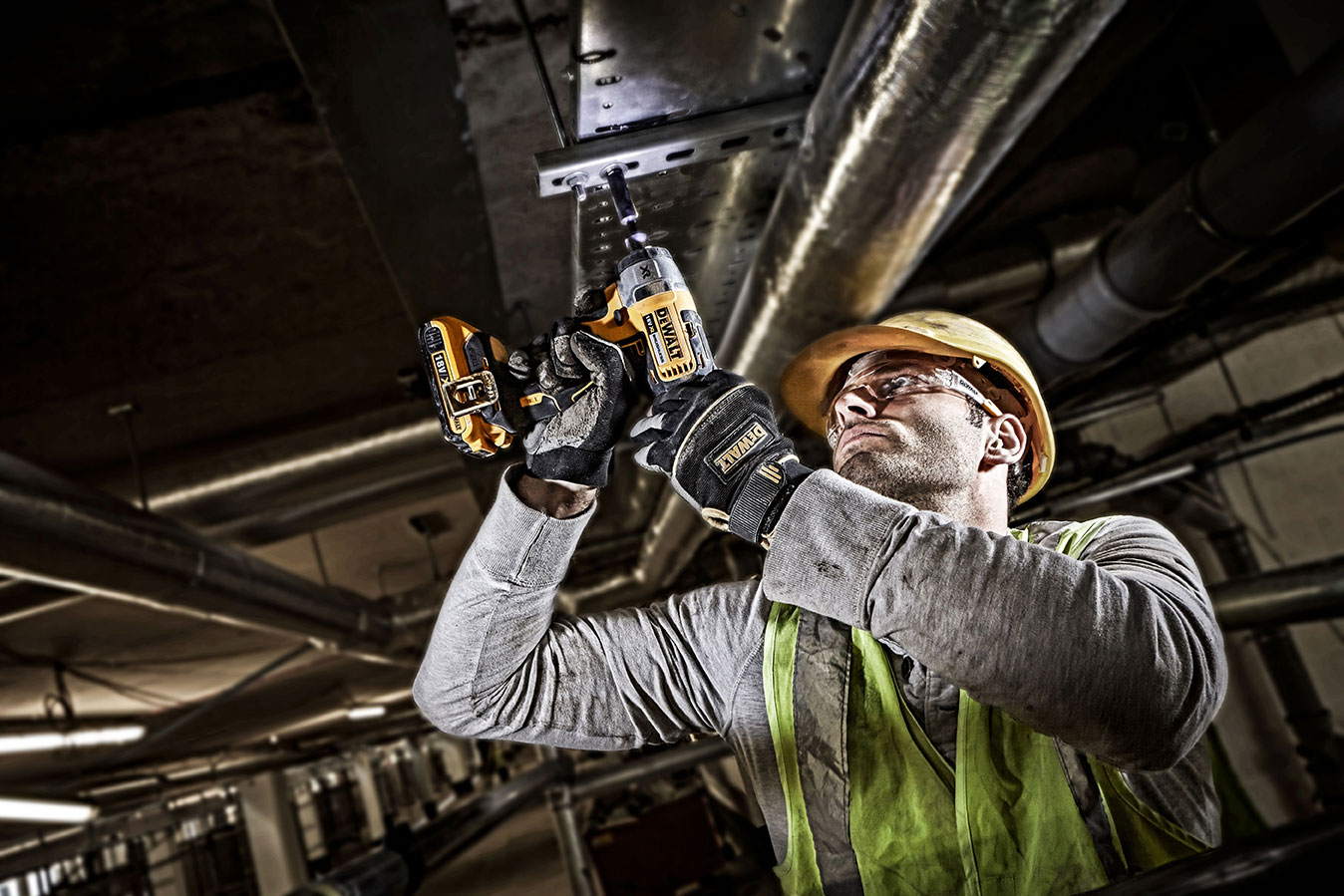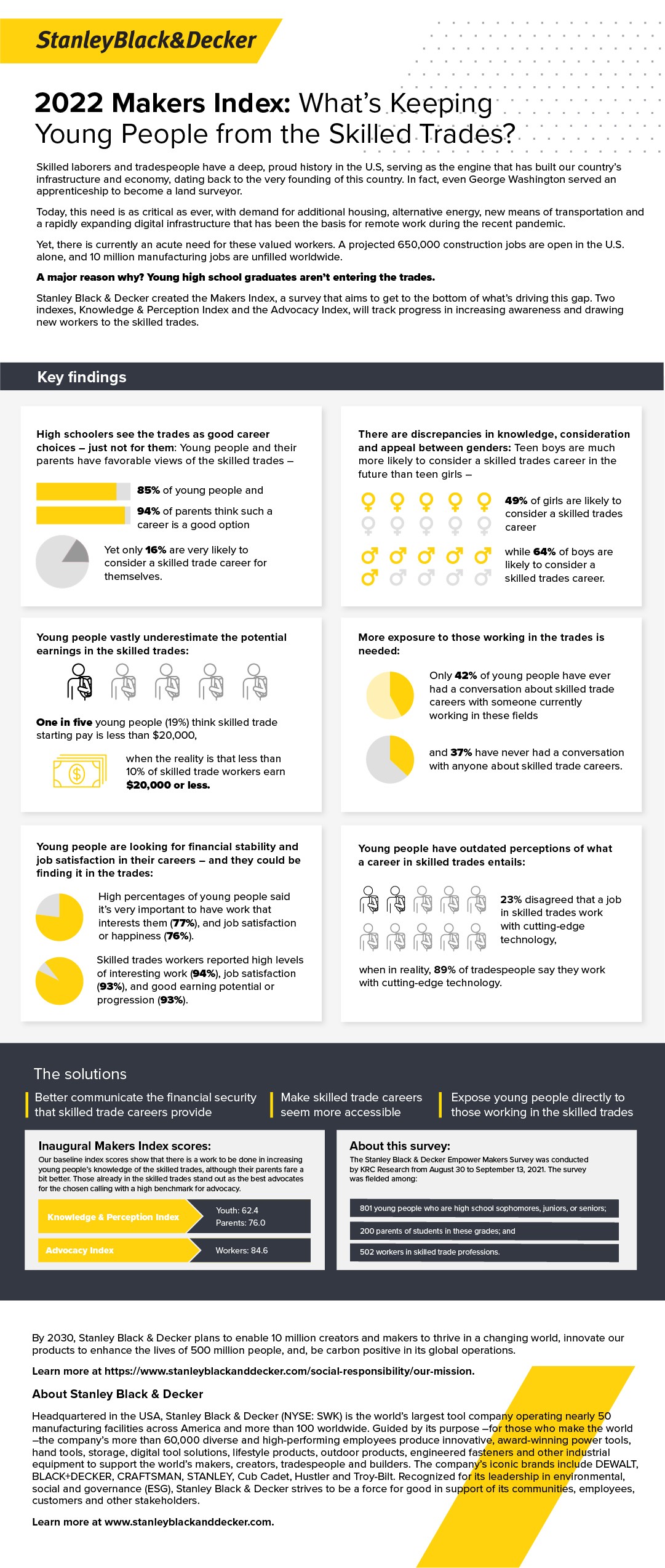Drilling into the Skilled Trades Shortage: Stanley Black & Decker's Inaugural Makers Index Reveals Few Students Likely to Consider a Career in the Trades; Outdated Perceptions Key Drivers
Stanley Black & Decker (NYSE: SWK) released findings from its inaugural Makers Index, highlighting a skilled trades shortage in the U.S. Despite 85% of youths and 94% of parents recognizing trades as good careers, only 49% have considered them, and just 16% are very likely to do so. Key factors include misconceptions about income potential, outdated views on technology in trades, and lack of engagement with trade professionals. The CEO emphasized the need for increased career education to attract the next generation of skilled workers amidst 650,000 open positions in construction.
- 95% of skilled trades workers recommend their careers.
- Half of skilled trade workers with less than 10 years' experience earn at least $50,000 to start.
- The study indicates a future pathway for addressing skilled labor shortages.
- Only 16% of students are very likely to consider a skilled trade career.
- Young people's perceptions about income in skilled trades are significantly underestimated.
- 58% of young people have never meaningfully discussed trade careers with professionals.
- Most students think skilled trades are a good career option, but just
- Young people underestimate the income potential for a skilled trade career; however, half of current skilled trade workers with less than 10 years' experience earned at least
- Most young people have outdated perceptions of the trades;
- Fifty-eight percent of young people have never talked meaningfully to a skilled trades professional about career opportunities
- Stanley Black & Decker convenes panel to discuss the state of the trades
NEW BRITAIN, Conn., April 5, 2022 /PRNewswire/ -- Stanley Black & Decker (NYSE: SWK) today released the results of its inaugural Makers Index, an in-depth research study examining sentiment about skilled trade careers in the United States, specifically among young people and their parents, with the goal of better understanding some of the underlying causes of the skilled trade labor shortage.
Experience the interactive Multichannel News Release here: https://www.multivu.com/players/English/88420511-stanley-black-and-decker-inaugural-makers-index/

The study surveyed three core audiences1 – high schoolers aged 14-19, parents of high schoolers and skilled trade workers – and the findings revealed a paradox that underscores the challenges associated with the skilled trade shortage: young people are not seriously considering it. While
"The skilled labor shortage is one of the biggest challenges facing the U.S. economy, with 650,000 open jobs in the construction industry alone," said Stanley Black & Decker CEO Jim Loree. "This problem existed long before the pandemic but has certainly been exacerbated by it. We must address this issue, or we risk even greater labor shortages in the future. The Makers Index study reveals a pathway to solve this challenge: collectively, there is more we can do to make trade careers resonate with young people. We can increase career and technical education (CTE) programs at schools and ensure students appreciate the income potential and lifestyle advantages of skilled trade careers. Businesses, government, civic leaders, educators, school administers, teachers and parents play a critical role in helping to develop and nurture the next generation of skilled trade workers. Working together, we can make progress toward solving the skilled trades shortage."
A closer look at the data reveals four key drivers of the skilled trades gap:
1. Misunderstanding of long-term financial security
Not surprisingly,
Of the younger people surveyed,
2. Incorrect knowledge of required skills
There has long been a narrative that young people don't want to enter the skilled trades because they dislike the idea of working in manual labor, but of the
At the same time, most young people have outdated perceptions of the trades, with
3. Lack of exposure to individuals currently in trade profession
Young people lean heavily on people they know – including parents (
Media and entertainment still play an important role in shaping career choices. More than six in 10 skilled workers with less than 10 years of experience said that media (print, online, social, ads, etc.) was influential and helpful in thinking about career plans, with the internet (
4. Continued male-dominated industry
When it comes to skilled trades, there are discrepancies in knowledge, consideration and appeal between genders. When asked about their familiarity with skilled trades, teen boys are more familiar than teen girls (
Makers Index Virtual Discussion: Drilling Into the Skilled Trades Shortage
Stanley Black & Decker hosted a virtual panel to dive deep into the Makers Index results, explore the underlying causes behind the skilled trades labor shortage and shed light on opportunities available within the industry.
The discussion was moderated by TV host and car enthusiast, Cristy Lee, a Stanley Black & Decker CRAFTSMAN® Tools Ambassador, and participating panelists included Shannon Lapierre, Chief Communications Officer for Stanley Black & Decker; John Malecki, YouTuber, custom wood and metal worker, and former NFL Lineman; and Abby Leonard, a fourth-year welding apprentice with Poole & Kent.
Empowering Future Makers
In 2021, Stanley Black & Decker launched the Empower Makers Global Impact Challenge, a five-year, up to
In addition, the company has established partnerships with organizations who are working to drive awareness and help close the skilled trades gap. These partnerships include:
- Rock the Trades, a workforce development initiative which provides opportunities for empowerment to those interested in pursuing a career in the trades, either through mentorships or scholarships.
- Through the company's partnership with the National Association of Manufacturers and the Manufacturing Institute, Stanley Black & Decker supports efforts such as "Creators Wanted," a campaign to build the modern manufacturing workforce of tomorrow.
To learn more about Stanley Black & Decker's Corporate Social Responsibility plan, click here and to learn more about its Environment, Social and Governance strategy, click here.
About the Makers Index
Stanley Black & Decker created two indices as part of this research: the Knowledge & Perception Index and the Advocacy Index. The Knowledge & Perception Index scores factors that influence consideration of a skilled trade career among youths and parents, including familiarity and perceptions, while the Advocacy Index scores factors that influence the likelihood of a skilled trade worker to recommend a skilled trade career to a young person, including job satisfaction.
In this benchmark study, youth scored a 62.4 out of a possible 100 on the Knowledge & Perception Index, while parents scored a noticeably higher 76.0. On their own index, workers scored very high as advocates – at 84.6 – driven by strong satisfaction and positive assessments of their career fields.
Full Makers Index findings and results can be found here.
Survey Methodology
KRC designed and fielded an online survey from August 30 and September 13, 2021, targeting three audiences: Youth (N=801), Parents (N=200), and Skilled Trade Workers (N=502)
About Stanley Black & Decker
Headquartered in the USA, Stanley Black & Decker (NYSE: SWK) is the world's largest tool company operating nearly 50 manufacturing facilities across America and more than 100 worldwide. Guided by its purpose – for those who make the world – the company's more than 60,000 diverse and high-performing employees produce innovative, award-winning power tools, hand tools, storage, digital tool solutions, lifestyle products, outdoor products, engineered fasteners and other industrial equipment to support the world's makers, creators, tradespeople and builders. The company's iconic brands include DEWALT®, BLACK+DECKER®, CRAFTSMAN®, STANLEY®, CUB CADET®, HUSTLER® and TROY-BILT®. Recognized for its leadership in environmental, social and governance (ESG), Stanley Black & Decker strives to be a force for good in support of its communities, employees, customers and other stakeholders. To learn more visit: www.stanleyblackanddecker.com.
Media Contacts
Debora Raymond
Vice President, Public Relations
203-640-8054
debora.raymond@sbdinc.com
Abigail Dreher
Director, Public Relations
860-922-4598
Abigail.dreher@sbdinc.com
1 KRC Research designed and fielded an online survey from August 30 and September 13, 2021 among three audiences: Youth (N=801), Parents (N=200), and Skilled Trade Workers (N=502)




SOURCE Stanley Black & Decker
FAQ
What are the key findings of Stanley Black & Decker's Makers Index regarding skilled trades?
How much do skilled trade workers typically earn according to the Makers Index?
What factors contribute to the skilled trades shortage highlighted by Stanley Black & Decker?
How many open skilled trades jobs are there in the U.S. construction industry?







